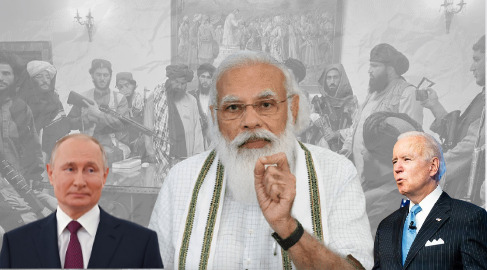The fall of Kabul is a historic event that carries important lessons in realpolitik for everyone including, India. The message is loud and clear- you don’t have any military allies. Afghanistan experienced it in reality, but it is equally true for India as well.
When Kabul fell, who came out to help Afghanistan? Well, no one. The US is pulling out all its troops. The UK, NATO and European countries fleed. India has a broad policy of not sending troops on the ground. China supports the Taliban itself. Meanwhile, Russia has stayed in Afghanistan, but it isn’t helping the people of Afghanistan. So, when push comes to shove, you are left fending for yourself.
So, if India goes to war tomorrow with Pakistan and China, or if there is a two-front war with both Pakistan and China, New Delhi shouldn’t think that any of its “allies” would come forward to help it. At least, there won’t be any help in terms of men, for there are no “brothers in arms” in the 21st century.
The concept of a military alliance with two opposite alliances fighting a war across different borders ended with the Second World War. In the Second World War, there was a clear distinction between the Axis and Allies. It was probably the last time when one military power came to the rescue of another. The UK and France were rescued by the US and Russia, after initial advances by Nazi Germany.
However, after the Second World War, we don’t have instances of two equal countries forming an alliance and taking on a common enemy in an all-out war. If there has been an alliance, it has been almost invariably restricted to a relationship between a superpower and a declining power.
For example, former British PM Tony Blair’s message to former US President stated, “I will be with you, whatever” before the Iraq invasion was a consequence of Blair’s compulsion to seek stronger ties with the US.
Now, if India were to go to war with Pakistan, will any of India’s ‘allies’ come rushing in to help? We are afraid they won’t. Countries like France and Israel might help with emergency military procurements or they might prioritise the delivery of key defence equipment. In fact, during the Kargil war in 1999, Israel was the first country to extend military assistance to India.
But can we conceptualize Israel or France sending boots on the ground or deploying their military assets in the subcontinent? Well, certainly not.
When it comes to the bigger military superpowers like Russia and the US, we can’t expect any help. Even under Trump, the US wouldn’t have gone as far as completely abandoning Pakistan and hammering it to assist India. Russia too wants to maintain some kind of balance between Islamabad and New Delhi. So, it will stay neutral. Again, in case of a Sino-India war, it would be a bit too far-fetched to expect Moscow to take on China.
Finally, when it comes to India’s Indo-Pacific allies, namely Japan and Australia, we cannot expect much assistance. Foremost, Japan and Australia aren’t huge military powers. They are currently strengthening their armies, and if India goes to war, say five years down the line, then Australia and Japan won’t be able to deliver much assistance.
Also, it is impractical to expect that Japan or Australia will cross large distances in the Pacific Ocean or the Indian Ocean to target India’s enemies.
It is not only Afghanistan that has no military allies. No country in the world has genuine military allies in a largely multi-polar world that doesn’t work with a binary of alliances but functions as a huge jigsaw puzzle of intricate relationships. India too has to accept and work with this reality.
Global support, if any, will remain largely restricted to the Twitter handles of international leaders or benign conferences and summits of powerful countries. Aggression by a belligerent power or terror group will be condemned, but it will not be acted against.
International support is restricted largely to trade relations, economic aid, soft loans and diplomatic comfort. However, the era of support in kinetic military action is long gone.
And in all fairness, India doesn’t need military allies. India is ranked the fourth strongest military power in the world. It can easily take on Pakistan and China in a one-on-one battle. However, the political leadership in New Delhi must always stay in sync with the military strategy to prepare for a two-front war scenario with Pakistan and China.
Moreover, Pakistan and China themselves won’t have any allies. If Pakistan goes to war with India, China might look to give out hefty loans to Islamabad and exploit it. At most, Beijing will send some defence equipment to Pakistan. Conversely, if China goes to war with India, Pakistan won’t have any money or defence equipment to help China with. All that Islamabad can offer is a few mercenaries which won’t make a huge difference.
The lesson from the fall of Kabul is clear- you are alone in this world, and you must always stand prepared to fight your enemies.
